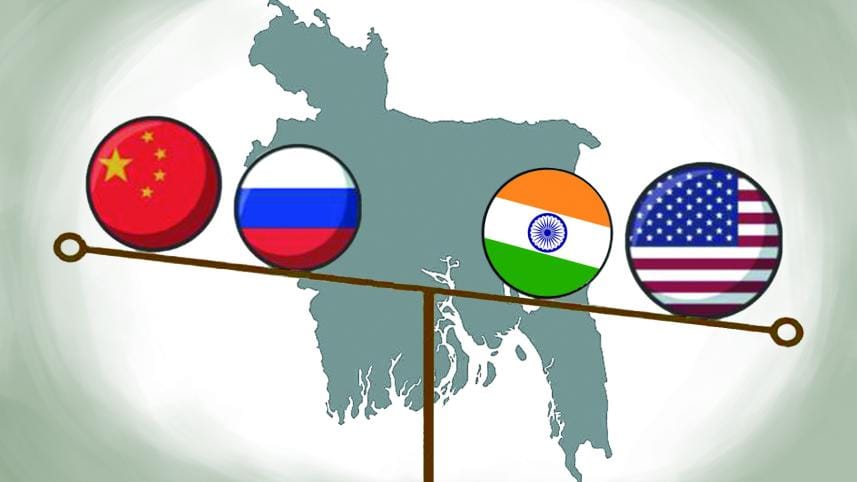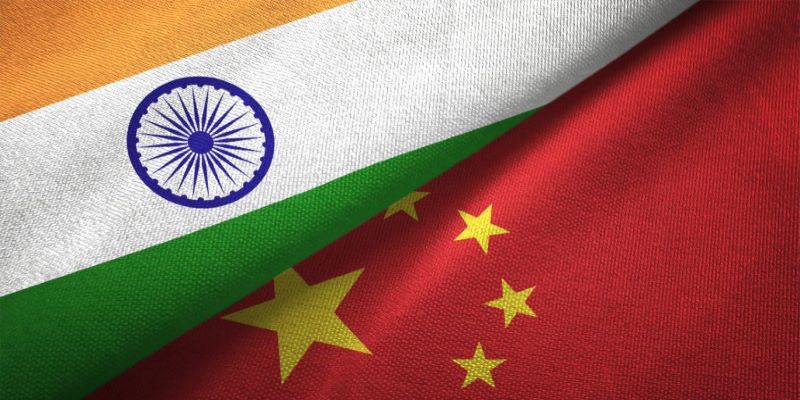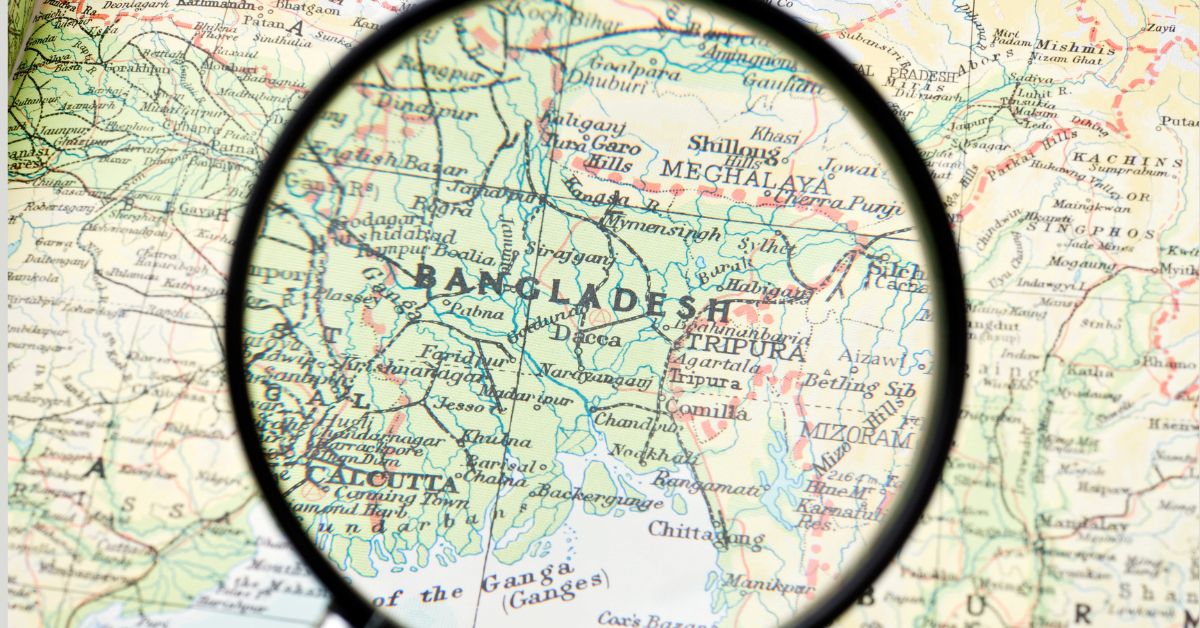What Russian warships in Chattogram port tells us about great power competition in Bangladesh

Last month, three Russian warships docked at Chattogram port for three days. According to Russian state media, it was the first such visit in nearly 50 years. Russian naval officers held meetings with their Bangladesh counterparts, and they participated in joint exercises.
This episode underscores how Bangladesh has become a prime battleground for great power competition. With so much attention focused on Bangladesh's upcoming election, it's easy to overlook the growing challenges that nonaligned Dhaka will confront in navigating sharpening geopolitical rivalry—regardless of the election outcome.
The story of the Russian warships far predates their arrival in Chattogram. Nearly a year ago, following US pressure, Dhaka refused to grant entry to a Russian ship bearing parts for a nuclear power plant because it was under US sanctions. Soon thereafter, Dhaka announced bans on 69 additional Russian commercial vessels under US sanctions, preventing them from entering Bangladesh.
Post-polls, the US may choose to review its relations with Dhaka if it concludes an election—that the opposition boycotts because of rigging fears—doesn't qualify as a "free and fair election." But if Washington downgrades ties with Dhaka, or implements additional punitive policies, that could set it back further in its competition with China and Russia for influence in Bangladesh.
Against this backdrop, Dhaka's hosting of the Russian warships should be seen as a balancing tactic that one would expect from a nonaligned state: after making those earlier concessions to Washington on Russia, Dhaka pivoted to reassert its longstanding friendship with Moscow. Dhaka's decision should pay off: Beijing likely welcomes its Russian friend projecting power in a maritime space where China is increasingly present. And New Delhi, an even closer friend of Moscow's, will hope Russia's show of strength can help balance out Chinese naval power in the Indian Ocean, making it less of a threat to New Delhi—so long as it doesn't lead to formal China-Russia naval partnership in the region.
Yet, balancing relations with these powers won't always be so easy. Indeed, it's becoming increasingly difficult to manage geopolitical competition. Unlike during the Cold War, it's not a bipolar world. Increasing multipolarity has created more space for the emergence of multiple competitive actors and theatres. But multilateralism, and broader global cooperation, aren't robust enough to push back on all these proliferating poles of competition and contestation.
Unsurprisingly, geopolitical competition is both expanding and intensifying, with direct implications for Bangladesh. There are increasing numbers of rival pairings. Those that impact Bangladesh the most are the US and China, India and China, and the US and Russia. Significantly, all three relationships are experiencing their most serious strains in years. Despite some recent easing of tensions, Beijing and Washington are at loggerheads over so much, from Taiwan to technology. A deadly border clash in 2020, along with the spread of Beijing's Belt Road Initiative across South Asia, have sunk China-India ties to their lowest level since their 1962 war. The Russian invasion of Ukraine has made US-Russia relations downright hostile.
These rival powers have increasingly compelling reasons to compete in Bangladesh. Chinese infrastructure and defence investments—including backing for Bangladesh's first submarine base—have picked up in recent years, which drives heightened Indian focus on Bangladesh. This same deepening Chinese footprint in Bangladesh, and China's increasing naval clout in Bangladesh's broader maritime backyard—from Beijing's naval base off Djibouti to its activities in the Bay of Bengal—fuel Washington's desire to become more engaged in Bangladesh. Tellingly, back in 2021, China's ambassador in Bangladesh, Li Jiming, warned Dhaka not to join the Indo-Pacific Quad. Dhaka has no interest in joining it, but Jiming likely wanted to pressure Dhaka not to get closer to New Delhi or Washington.
US-Russia competition in Bangladesh is exacerbated by Russia's invasion of Ukraine. Washington wants to build a coalition of countries to take a strong stand against Russia. Just weeks after the invasion, Victoria Nuland—a top State Department official viewed as especially hawkish on Russia—visited Dhaka. But Russia is keen to project power globally and signal to Washington that its war in Ukraine hasn't weakened or isolated it. Because of its longstanding friendship with Bangladesh (and India), the Bay of Bengal area is a desirable destination to do so—as evidenced by the visit of Russian warships. It's also worth noting that in September, Sergey Lavrov became the first Russian foreign minister to visit Bangladesh.
One might point to India's experiences as an example of how nonaligned states can successfully manage complex great-power competition. But in fact, Bangladesh has a tougher job. India, unlike Bangladesh, is an avowed competitor of Beijing's. US-China competition has brought New Delhi closer to Washington and strengthened its own capacity to counter China, through more arms sales and intelligence sharing. Bangladesh, by contrast, with its evergreen mantra of "friendship to all, malice toward none," must balance its relations with everyone. But Dhaka, down the road, could find itself under unprecedented pressure to get off the fence in the event of a worst-case scenario—such as China's invasion of Taiwan or Russia expanding its war beyond Ukraine into a NATO country.
How might the upcoming election impact great power competition in Bangladesh? There's no outcome that can deter or rein it in. But the most likely outcome—the Awami League retaining power—could disadvantage Washington relative to China and Russia, and cause friction with its partner India.
Washington's policy of pressuring Dhaka to hold free and fair elections has not gone down well with the AL leadership, despite US-Bangladesh relations otherwise enjoying ample forward movement in recent years. By contrast, Beijing, Moscow, and especially New Delhi—thanks to the mutually supportive relations between the AL and India's ruling Bharatiya Janata Party—all enjoy warm relations with the AL. This isn't to suggest China—or Russia—wouldn't find willing partners in a hypothetical non-AL government. Still, a comment last year by Beijing's ambassador, Yao Wen, which appeared to reject the restoration of the caretaker clause—the opposition's core demand—reflects China's strong comfort level with the AL.
Consequently, an AL victory would position China, India, and Russia well for post-election engagement with Bangladesh, while Washington—which has likely burned some bridges in Dhaka with its visa restrictions policy and periodic public criticism about democratic backsliding—would be in a tougher spot.
Post-polls, the US may choose to review its relations with Dhaka if it concludes an election—that the opposition boycotts because of rigging fears—doesn't qualify as a "free and fair election." But if Washington downgrades ties with Dhaka, or implements additional punitive policies, that could set it back further in its competition with China and Russia for influence in Bangladesh. Beijing and Moscow could score additional points by accusing the US of meddling in Bangladesh's politics and failing spectacularly. Meanwhile, New Delhi—which doesn't want Washington to do anything that emboldens an opposition that India regards as a dangerous Islamist force with the potential to imperil its own interests—wouldn't support a harsher US policy toward Dhaka.
Given the complexity of intensifying great power competition in Bangladesh, it would be imprudent to ask which power is winning. But this much is true: electoral politics in Bangladesh don't appear to work in Washington's favour as it looks to push back against Chinese and Russian influence, and to find more policy convergence with India in a country where the two don't see eye to eye.
Michael Kugelman is director of the South Asia Institute at the Wilson Center in Washington, DC.
We welcome your contributions and analysis of global events. To submit articles to our new page, Geopolitical Insights, please send us an email at ramisa@thedailystar.net.
Follow The Daily Star Opinion on Facebook for the latest opinions, commentaries and analyses by experts and professionals. To contribute your article or letter to The Daily Star Opinion, see our guidelines for submission.




 For all latest news, follow The Daily Star's Google News channel.
For all latest news, follow The Daily Star's Google News channel. 


Comments